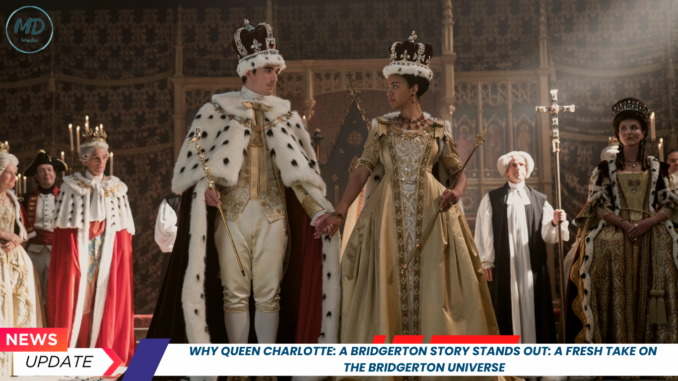
If the title of Bridgerton is mentioned, you’re going to have some kind of idea of what the series will be like before even watching it.
So far in the two seasons of the original Netflix series, we’ve had stair-side sex scenes, the wet shirt pandemonium that Anthony Bridgerton caused and lest we forget the stolen glances, whispers of sweet nothings and unashamed raunch that keeps viewers hooked.
So it’s natural to think that Queen Charlotte: A Bridgerton Story may be like that too. Well, it most certainly isn’t – and it’s all the better for it.
Bridgerton is a great series, an engaging universe and an endearing story but what came before the diverse Ton that we see in the current Netflix series? Quite beautifully, that’s where Queen Charlotte’s prequel series comes into play.

Telling the love story between Queen Charlotte (played by India Amarteifio) and King George (played by Corey Mylchreest) is a tale within a tale; it’s multi-layered and complicated, taking you through their initially politically advantageous arranged marriage to their newlywed status.
They’re young, enthusiastic and from the first time they meet – rather awkwardly as Charlotte is attempting to mount a wall in search for her mysterious husband – it’s clear they have an undeniable connection.
Their backstory is one fans have been pondering since Bridgerton’s first season. It’s always remained somewhat of a mystery but in this series, we uncover all their initial awkwardness, tension, chemistry and, more than anything, unwavering love for one another.
It’s a side we don’t see of Queen Charlotte – she’s usually the confident figure of power and elegance, which she does clearly have as a teenager but you see how that forms, what has led her to be the woman we know.
In her younger self, we see her enthusiasm, her willingness to make things work with George, but also her unflinching desire to remain true to herself and what she believes is her duty. Which, in this case, is her love to the King and to produce an heir, something that we also see is a stressor for the elder Queen, who is seen chastising her own children for not being as devoted to their duty as she was.
Unlike the Bridgerton seasons which have come under fire for seeking to exist in a somewhat ‘post-racial’ society where discrimination and racism are merely things of the (supposed) past, this series looks the topic of race boldly in the face in a searing way.
To have a Black woman as the centre of any period drama is a celebrated feat in itself and something that should be more of the norm in the drama genre.
The fact that she is Black and also comes from Germany is something that makes King George’s mother and many other aristocrats within their high society uncomfortable. But it’s nothing to deter the new Queen, who is resolute in the fact that she’s been tasked by her brother to marry this man and seeks to excel at her newfound role as wife.
She brushes aside negative comments with ease, but also swallows back her own pride for the sake of not creating tension in scenes where her skin tone is commented on and her hair is gawked at. For someone so young, you almost instantly are drawn to the young Queen Charlotte, who is fierce, smart, matter-of-fact and a joy to watch.
It’s a testament to Amarteifio, who shines in her own way as Queen Charlotte, embodying the confidence we know her to have but also the trepidation, loneliness and naivety that really propels this show forward into seeing her become the figure audiences love.
If you’re looking for the kind of series that is heavy on the steamy sex scenes, Queen Charlotte: A Bridgerton Story isn’t that (although it does have its glorious fair share) because it centres on the sweet, genuinely heartfelt tale of love between these two young royals.
There are countless lines from the King that will leave audiences swooning, as well as touching moments that will leave you rooting for the Queen. More than anything, though, you watch on hoping for the best for this couple, even if Bridgerton shows us that it’s far from a happy ending.
We know already (from Bridgerton and the real-life figure of King George III) that George’s illness was so severe, he was kept away from the public. In Bridgerton, he is rarely seen alongside his wife but this prequel series shows that emotional journey.
The period drama harrowingly captures those attitudes that would’ve existed towards medicine and mental health at the time, which makes for some of the more heart-wrenching scenes.
Elsewhere in the series, we get to explore how the young Agatha Danbury (played wonderfully by Arsema Thomas) became a Lady and how her escalation into high society was as a direct result of Dowager Princess Augusta’s (Michelle Fairley) attempt to appear as though she’s a supporter of diversity.
The scenes between the two of them – which are emblematic of the very British way with which tension is dealt with – are some of the absolute highlights of Thomas’s performance, which is also peppered with humour.
Throughout the series, we too see how this young character transforms into the older woman we know from Bridgerton, and it will almost certainly leave audiences surprised. But for both the young Lady Danbury and Queen Charlotte, it’s also important to see their journey of discovery and exploration of their own sexuality in the series.
With all the classical pop song covers, breathtaking regal costumes and undeniable on-screen chemistry, Queen Charlotte: A Bridgerton Story may seem, on the face of it, to be like the original show it’s framed around.
But it’s taken its time to be more thoughtful, considered, relatable and topical, delivering a delightful series in the process.